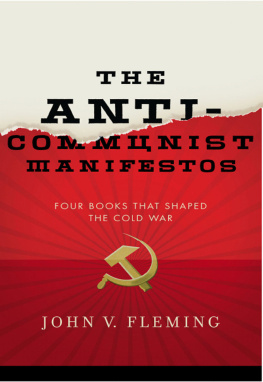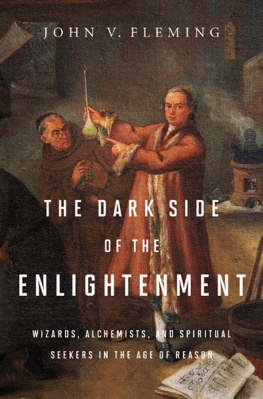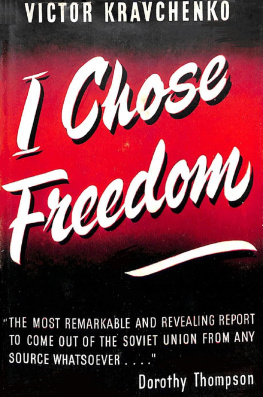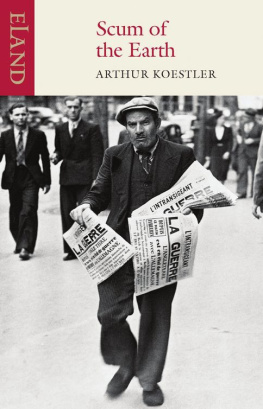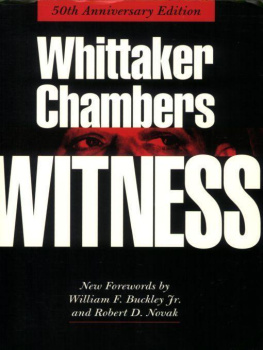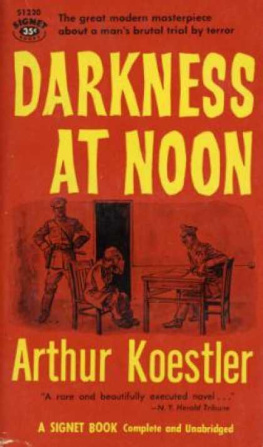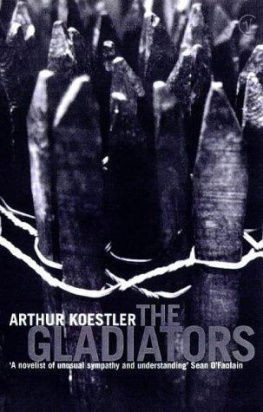JOHN V. FLEMING
W. W. NORTON & COMPANY
NEW YORK LONDON
Copyright 2009 by John V. Fleming
Fleming, John V.
The anti-communist manifestos: four books that shaped
the Cold War / John V. Fleming.1st ed.
p. cm.
Includes bibliographical references.
ISBN: 978-0-393-07476-5
1. Anti-communist movements. 2. Ex-communistsBiography. 3. Koestler, Arthur, 19051983. Darkness at noon. 4. Valtin, Jan, 19041951. Out of the night. 5. Kravchenko, Victor, 19051966. I chose freedom. 6. Chambers, Whittaker. Witness. I. Title.
HX40.F572 2009
335.430922dc22
W. W. Norton & Company, Inc.
500 Fifth Avenue, New York, N.Y. 10110
www.wwnorton.com
W. W. Norton & Company Ltd.
Castle House, 75/76 Wells Street, London W1T 3QT
INTRODUCTION
T HE SUBJECT OF T HE A NTI -C OMMUNIST M ANIFESTOS is the role played by four unusually influential books in the great political struggle, usually called the Cold War, that dominated much of the second half of the twentieth century. Hence one could say that the protagonists of this book are themselves books.
The struggle of the Cold War had many aspects, or fronts, as Communists sometimes called them, but at its heart it was a conflict of competing social and political visions. At the level of abstraction the conflict was never resolved, and it probably will never be resolved. At the pragmatic level, however, there was a decisive victory for anti-Communism. Communism, the specter that according to Marx and Engelss Communist Manifesto was haunting Europe in 1848, and quite truly was haunting Europe still, or again, in 1948, has in 2009 become a mere ghost, which is something altogether different.
Amidst the complex history of which the practical defeat of Communism was the outcome, there are a few thick strands that seem comparatively easy to grasp. One of these is that for explicable though not inevitable historical reasons the concept of Marxist Communism became inextricably linked with the Bolshevik coup dtat of 1917 and with the Union of Soviet Socialist Republics, which claimed to be the Revolutions implementation or continuation. We can go even further and say that the idea of Communism became localized in the Soviet Union of Joseph Stalin, who came to power in the 1920s and stayed there until his death in 1953. For this reason the critique of Communism at the practical level was an interpretation of Soviet history and, in particular, an assessment of the degree to which the abstract theories of Marxist socialism were vindicated or repudiated in their concrete expressions within Soviet life.
From its inception, the Soviet State was the object of great and often sympathetic interest in the West: but it was also beleaguered, remote, and difficult of access. Hence what Westerners knew of it came almost exclusively from literary sources, that is, from the dispatches of newspaper correspondents and the reports of travelers. We say that seeing is believing; in fact, it is just as true that believing is seeing. Many early reporters and visitors were partisans of the socialist ideal who filtered what they saw through the fine mesh of their own hopes and desires.
There are numerous scholarly books about the early reporters of Soviet life. Their relationship with their hosts tended to be the relationship of tourists to guides. Of course, the Soviet authorities ran the real tourist agencythe famous Intouristthat organized all aspects of a visitors sojourn: transportation, lodging, meals, sightseeing; visits to the newly invented or radically reformed institutions of communal life: the factory, the school, the prison, the hospital, the farm.
Many early visitors to the USSR are aptly called pilgrims. The traveler and the pilgrim cannot always be distinguished, but the salient difference between them is this: the pilgrim knows in advance what he is to see, knows and desires it, and even as he views it, is planning how he will tell the folks back home. Toward the end of the Divine Comedy, Dante captures pilgrim psychology in a lovely simile meant to convey his astonishment at having been transported from time to eternity, from the human to the divine, and from Florence to a people just and saneand, as a pilgrim, in the temple of his vow, content within himself, looks lovingly about and expects to tell his tale when he gets home. (Hollander trans.)
The thought crimes of Sidney and Beatrice Webb have been so efficiently prosecuted by earlier writers that there is little need to rehearse them here. The Webbs were pioneering British Socialists, the founders of the Fabians, who in scholarly collaboration produced important work of a progressive tendency. Like so many other socialists, their enthusiasm for collectivist theory apparently blinded them to its actual practice in the Soviet Union of the 1930s, at that time the worlds only workers state. In the run-up to the Stalin Constitution in 1936, they published a very large, laudatory, and influential book called Soviet Communism: A New Civilization? A few years later, they brought out a second edition that benefited from the large increment in our knowledge of the Soviet realities only by removing the question mark from their title.
There were of course from the very start some dissenters, but on the whole Western intellectuals bought into a fictive history of their heavenly city that was vulnerable to an authoritative empirical refutation exemplified in different ways by the four anti-Communist manifestos that occupy the ensuing pages. It is one of the striking features of anti-Communist literature that its great writers are all former Communists. We can appreciate how peculiar this is if we consider a few other antis. It will not be easily assumed that most anti-Semites, anti-racists, anti-vivisectionists, or anti-Americans are former Semites, racists, vivisectionists, or Americans. Surely the adepts of that spelling bee chestnut of my childhoodantidisestablishmentarianismcannot mostly have been disgruntled disestablishmentarians?
But all four of these anti-Communist authors were Communist renegades, Party members whose deep disillusionment led them to turn upon their former allegiance in literary fury. One (Arthur Koestler) was a Hungarian journalist of German speech and culture, a polymath intellectual. Another (Richard Krebs, aka Jan Valtin) was a German sailor and labor agitator. The third (Victor Kravchenko) was a Soviet engineer of Ukrainian background. And the fourth (Whittaker Chambers) was an American journalist. Three of them had been, to a greater or lesser degree, underground espionage agents of the Comintern. All of them seemed to speak with great knowledge and authority about the nature of Communism and the international Communist movement, and what they had to say was not pretty. Each had a dramatic impact on an unusually wide readership.
Though they wrote very important books, they were not necessarily therefore wholly attractive or admirable men. The moral relationship between an authors life and work is a question with a troubled history going back at least to Plato. Very few of us today would agree with Sir Philip Sidney that to be a good writer you must first be a good person. All four of the authors dealt with in this book attract my full attention but only at best my partial admiration. The life experience of each, which included that special form of purgatorial fire Communism orchestrated for its apostates, would have been enough to test even the strongest character. Arthur Koestler I regard as a modern genius; he appears also to have been a serial rapist, or a hell of a raper, in the words of his friend Richard Crossman, MP, the editor of The God That Failed. Richard Krebs (Jan Valtin) was by his own testimony a professional thug for half his adult life. He was probably a murderer, though his time spent in San Quentin was only for attempted murder. His first American wife left him when, in her words, she became unable to endure his further violence.

